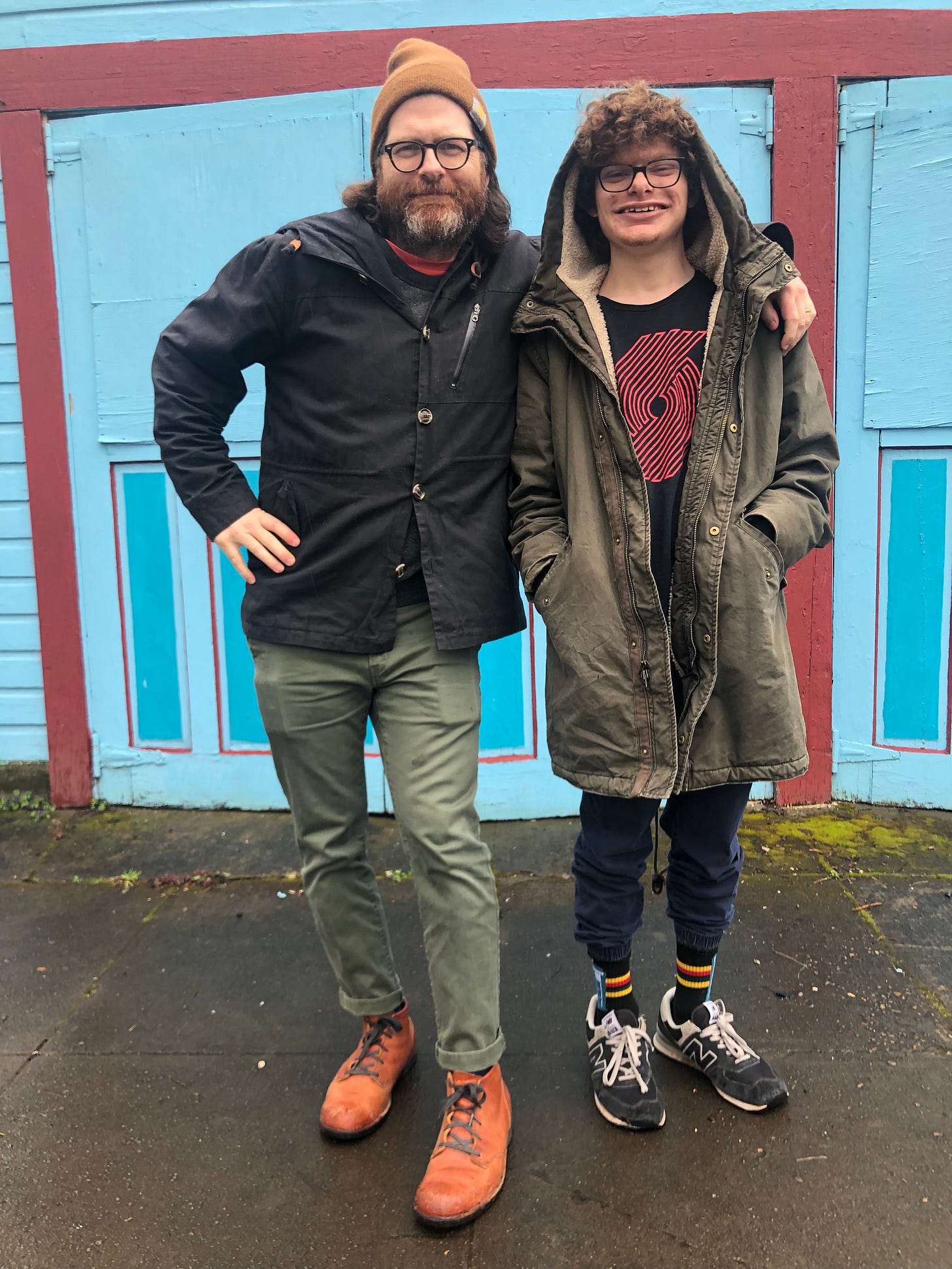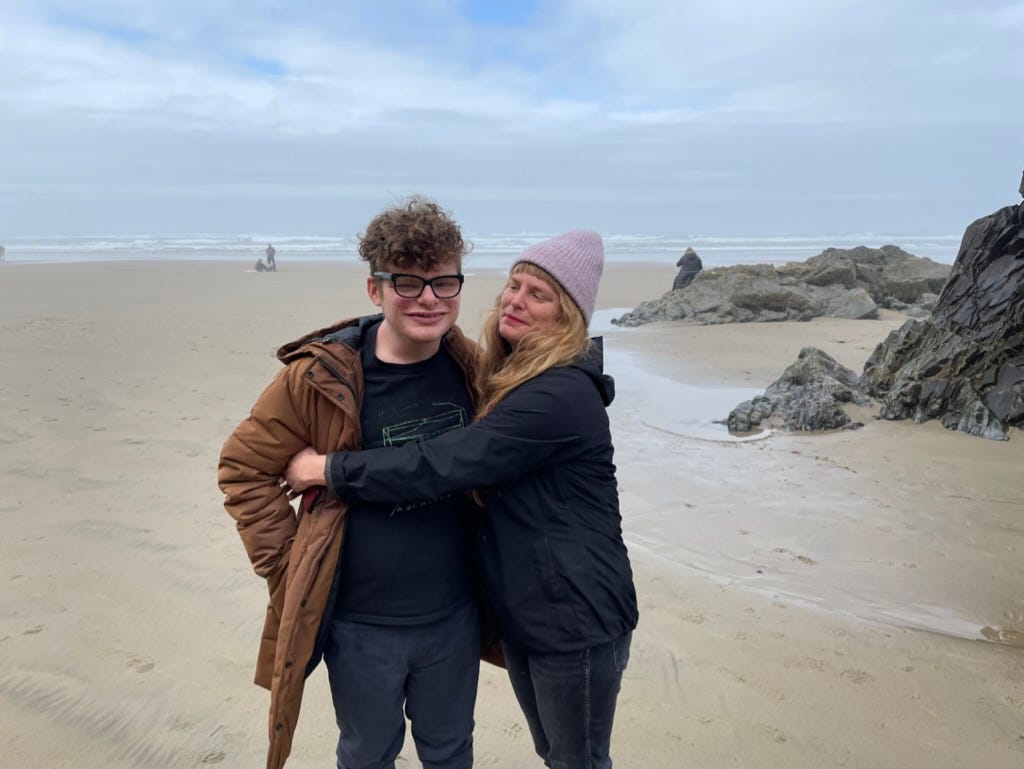It’s April: the daffodils are blooming, the cherry blossoms are exploding, and we turn our thoughts to our autistic fellow humans throughout the world. It’s Autism Acceptance Month!
Or, as the U.S. Government calls it, Autism Awareness Month. More and more autism advocacy groups and autistic people, however, are using the month of April to reflect on autism acceptance rather than awareness. The issue facing autistic people is not a lack of awareness — not anymore — but rather a lack of accommodation and recognition.
As many of you know, I’m the dad to an autistic human. Hank was diagnosed with PDD-NOS in 2008 when he was two. Things have changed a lot since Hank got his diagnosis; back then, two was too young to receive an ASD (autism spectrum disorder) diagnosis, so he got slapped with the slightly more confusing and clunky acronym for Pervasive Development Disorder-Not Otherwise Specified. He was late to talk, he had difficulty making eye contact. He was perhaps overly fond of leafing through books.
That spring and summer of 2008, from the moment when a speech pathologist first voiced her suspicions that Hank might be autistic to the moment at Doernbecher Children’s Hospital when we got the official diagnosis, those were some very transformative and trying times for Carson and me. In the midst of it all, as my photo album reminds me, I managed a nationwide solo tour with Carson and Hank in tow. We then decamped to the south of France to live in a farmhouse for a month while I wrote songs for what would be The Hazards of Love, then returned home to get married in a field in Oregon. Oh, and we also moved houses. Jesus. In the midst of it all, we reckoned with our new lives, parenting a child with a significant disability.
It was a crash course, learning everything we could about autism, and we were funneled, like so many new parents of autistic kids, into the arms of Autism Speaks, the nation’s (and perhaps the world’s) largest autism-related organization. The clinic that gave Hank his diagnosis actually sent us away with a binder of information that was provided by Autism Speaks.
In the spring of 2009, while I was on tour, Carson and my sister Leah participated in an Autism Speaks Walk. They were shocked to see people protesting along the walk route. What’s more, Carson reported to me, many of those people doing the protesting were actually autistic adults. It was an eye-opening moment. So now, while we were learning at-home strategies and therapies for helping Hank along, we were educating ourselves on the politics of autism and the fact that many autism organizations, including Autism Speaks, were not necessarily advocating for the best interests of autistic kids and adults. Some of them, like Defeat Autism Now, were devoting themselves to this idea of wiping autism — including autistic people — off the face of the earth entirely.
We loved our kid, we were enamored of his uniqueness and we were resolved to face the challenges of being his parents. We didn’t want him wiped off the face of the earth. We soon understood that his autism was inseparable from who he was as a person. “Curing” his autism would mean erasing Hank altogether — what would that even look like? We threw ourselves into therapies and social groups that would, hopefully, make his life easier and better — but that was all we could do.
Along the way, we were introduced to organizations like the Autistic Self-Advocacy Network and the Thinking Person’s Guide to Autism. We read the writing of autist allies like Steve Silberman and learned about this idea of neurodiversity, that we should see autistic people not as individuals who need to be saved or cured, but as people who should be seen and accommodated. This resonated with us.
Now Hank is almost 18 and a new adventure awaits us all — his path into adulthood. We’ve long known that the majority of funding from governmental and non-profit autism organizations is targeted at genetic research and early childhood therapies. Less than 2% of funding goes toward studying and supporting adult autistics. As Hank has grown older, we’ve noticed the change in how the world sees him. I think it’s much easier for the community at large to experience a child with a disability; adults with disabilities receive a very different treatment.
So this April, as the rains abate and the sun hangs in the sky a little longer, I’m asking you to celebrate the autistic people in your life and in your community (and there are autistic people in your community, whether they are visible or not) by promoting and advocating for their acceptance rather than merely being aware of them.
Happy Autism Acceptance Month!











As an adult with ASD - thank you, thank you, thank you.
Thank you so much for writing this, Colin. This is beautiful and brought me to tears.
I’m 54 years old, and suspect that I’m on the spectrum, but finding testing & diagnosis as an adult is absolutely impossible. I’m already well into life, so I don’t expect a diagnosis to really change anything - I know myself and how to deal with the way my brain works. A diagnosis would be validating, though. It would help me understand myself better, and allow me to put a “label” to what I already know in my heart.